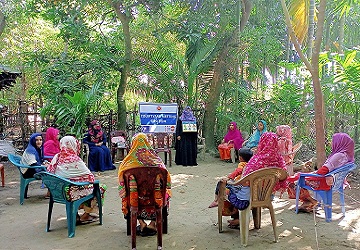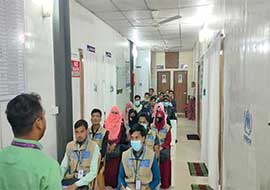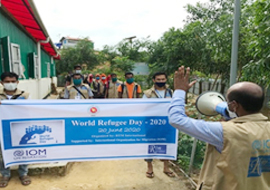Education
• Evaluation for the End Line Evaluation for the PRIO Project Bangladesh (PRIO-19-10001: Improving education for Rohingya refugees from Myanmar living in Bangladesh)
Period: (January to November 2019)
Client: Innovations for Poverty Action
Client: Innovations for Poverty Action
Innovations for Poverty Action (IPA) in collaboration with the Cornell University, United States and the Peace Research Institute (PRIO), Oslo, Norway, are conducting the EducAid Project study related to education experiences in Bangladesh to collect facts and information to understand how to improve such services. IPA has contracted RTM International to conduct the endline evaluation of the project. The purpose of this endline study is to know the education needs, preferences, and expectations of refugees. Study will be conducted both in the camp and host communities of two upazilas (Ukhiya and Teknaf) of Cox’s Bazar district. Target people for this evaluation are households with members between the age of 4 to 18 years old living in Cox’s Bazar area either in the camp or host communities. A survey of 1,200 households through face to face interview will be conducted targeting households with members between the age of 4 to 18 years old living in Cox’s Bazaar area either in the camp or host communities. The survey will collect information on demographic characteristics of the household, education information of all the children in the household and perspectives of the respondent on various areas including gender issues. Household head will be selected for this survey, if not available, a household member who has information on the children’s education details in the household will be selected.
• Comprehensive situation assessments of health professional education in Bangladesh
Period: October 2011 to September 2012 Country: Bangladesh
Client: Rockefeller Foundation
RTM International received a grant from Rockefeller Foundation for conducting a comprehensive situation assessment of health professional education in the country especially with focus on MBBS, Nursing and Public Health courses. The study was conducted in collaboration with Directorate of Health Services (DGHS), Ministry of Health & Family Welfare and James P Grant School of Public Health, BRAC University. It was a part of the ’Transforming Health Systems’ initiative of Rockefeller and a regional consensus on HRH education systems. This was a five country (5C) project which also was conducted in China, India, Singapore, and Vietnam at the same time. We provided training to data collectors in February, 2012 and started the data collection. The data were collected at both national and institutional level. We collected national level data from the key informants, who were the members of policy making committee for the health professional education of Bangladesh. We also interviewed the principals and departmental heads of 23 Medical colleges, 28 Nursing Institutions and 18 Public Health Institutions/departments for institutional level data. We also collected data from the final year students and health professional (e.g. Medical doctors, Nurses, Public Health Professionals) who were the existing members and future members of the whole health profession of Bangladesh. The dissemination of the report took place in December 2012.
• Name of Project: Teaching in Primary School Classrooms: Do Teachers Understand and Use Interactive Teaching
Period: May -July 2011 Country: Bangladesh
Client: ACER
Short description of the work: RTM International conducted a study on Interactive Teaching in Primary School Classrooms in collaboration with Australian Council for Educational Research (ACER). This study focused on the effects of training programs provided under the Second Primary Education Development Program (PEDPII), which in turn focused on quality improvement in classrooms through the use of interactive teaching techniques. The study covered 591 primary schools all over Bangladesh mostly placed in remote areas. This study also examined the extent to which these techniques were understood and used by primary school teachers. A total of 34 Field Investigators under supervision of 7 Quality Monitors were engaged for data collection using the instruments: School Observation, Classroom Observation, Teacher Questionnaire I and II, and Quality Monitor Record Sheet.
Period: May -July 2011 Country: Bangladesh
Client: ACER
Short description of the work: RTM International conducted a study on Interactive Teaching in Primary School Classrooms in collaboration with Australian Council for Educational Research (ACER). This study focused on the effects of training programs provided under the Second Primary Education Development Program (PEDPII), which in turn focused on quality improvement in classrooms through the use of interactive teaching techniques. The study covered 591 primary schools all over Bangladesh mostly placed in remote areas. This study also examined the extent to which these techniques were understood and used by primary school teachers. A total of 34 Field Investigators under supervision of 7 Quality Monitors were engaged for data collection using the instruments: School Observation, Classroom Observation, Teacher Questionnaire I and II, and Quality Monitor Record Sheet.
• Study on the basic determinants of drop-out behavior in the learning centers of the BEHTRUWC (2010)
Client: UNICEF, Bangladesh
Client: UNICEF, Bangladesh
RTM International conducted a study to investigate the basic determinants of drop-out behaviour, to identify the root causes of drop out and also to capture community’ and other stakeholders’ views of remedial measures to drop-out in the learning centres of the six divisional cities with the financial support of UNICEF.
• Study on the basic determinants of drop-out behavior in the learning centers of BEHTRUWC (November 2009 - February 2010)
Client: UNICEF Bangladesh office
RTM International conducted this study to investigate the basic determinants of the dropout behavior of the children attending the learning centers under the "Basic Education for Hard to Reach Urban Working Children (BEHTRUWC) project of UNICEF. In the identification of reasons for drop-out behavior, the views of the community and other stakeholders were taken and the possible measures were mooted to arrest the drop-out rate. A total of 50 learning centers from among 384 such centers throughout the country were selected. Quantitative data were collected from secondary sources and through physical visit to the learning centers. Qualitative data were collected through interviews with dropped-out children and their parents, KIIs and FGDs with members of the Center Management Committees. In addition, case studies on dropped-out children were under taken.
• Assessment of Education programs for Myanmar Refugees (March 2010 – May 2010)
Client: UNICEF Bangladesh office
Client: UNICEF Bangladesh office
RTM International works to contribute to the improved provision of accessible, high quality education services for the people especially for the poor and underserved. Under a contract with UNICEF in October 2008 RTM International implemented the ’Basic Education Program’ in the two camps housing the Myanmar refugee in Ukhiya and Teknaf. The objectives of the program were (i) to impart center-based Early Childhood Education (Play group and pre-school) to 90 percent of the children aged 4-6 years. (ii) to impart primary education to 90 percent of children aged 6-10 years and (iii) to assist 75 percent of the families having children under 3 years in practicing age-appropriate interactive care at home. The program was run with 7553 children and 108 teachers through 18 schools.
• Participatory Evaluation-Causes of Primary School Drop-Out (Mar 2009 - Jun 2009)
Client: UNICEF Bangladesh office and Directorate of Primary Education (DPE)
RTM International conducted this evaluation to identify the basic determinants and root causes of dropout behavior in primary school and to capture school community’s views of remedial measures of drop out. The study team visited 25 sites (17 rural and 8 urban). With the view to capture the geographical diversity, mostly the remote and inaccessible zones with reported high drop out rates, low completion rates and low literacy rate were given special attention in the selection process.
• Bangladesh: An Assessment of the Current Situation of production of nurses and medical personnel
Client: Swisscontact - Katalyst
Client: Swisscontact - Katalyst
RTM International conducted this study to assess the capacity of colleges/institutes to produce nurses, medical assistants and technicians; to examine the quality of education and training imparted at the colleges/institutes ; to identify problems in expanding the institutional capacity; to identify the effectiveness the health workers (e) and to examine their relevance in the Bangladesh context. The study was also a part of the Bangladesh Health Watch study and its main theme for 2007 was ’Health workforce’.
-
Current Information
-
Activities Pictures
RTM International are implementing Health Support and research activities in the different Districts of Bangladesh which are funded by different Donors.
RTMI-UNFPA Project

Courtyard meeting organized by RTMI-UNFPA
RTMI-UNHCR Project

CHW training on scabies prevention
RTMI-IOM Project

World Refugee Day - 2020
